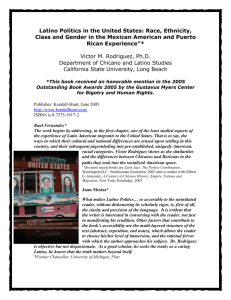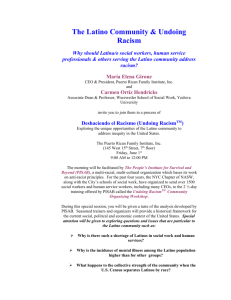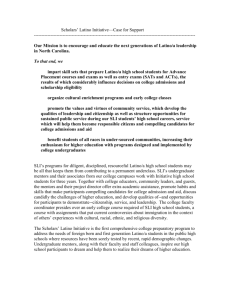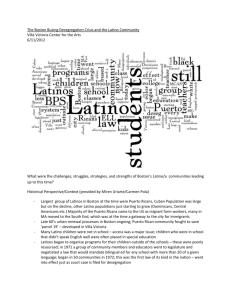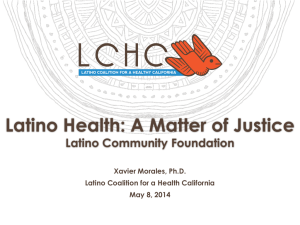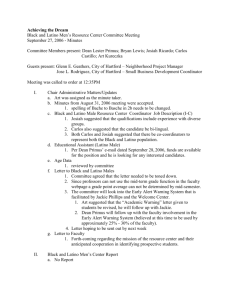ENGLISH 202/RACEETH 202 Introduction to U.S. Latino/a Literature
advertisement
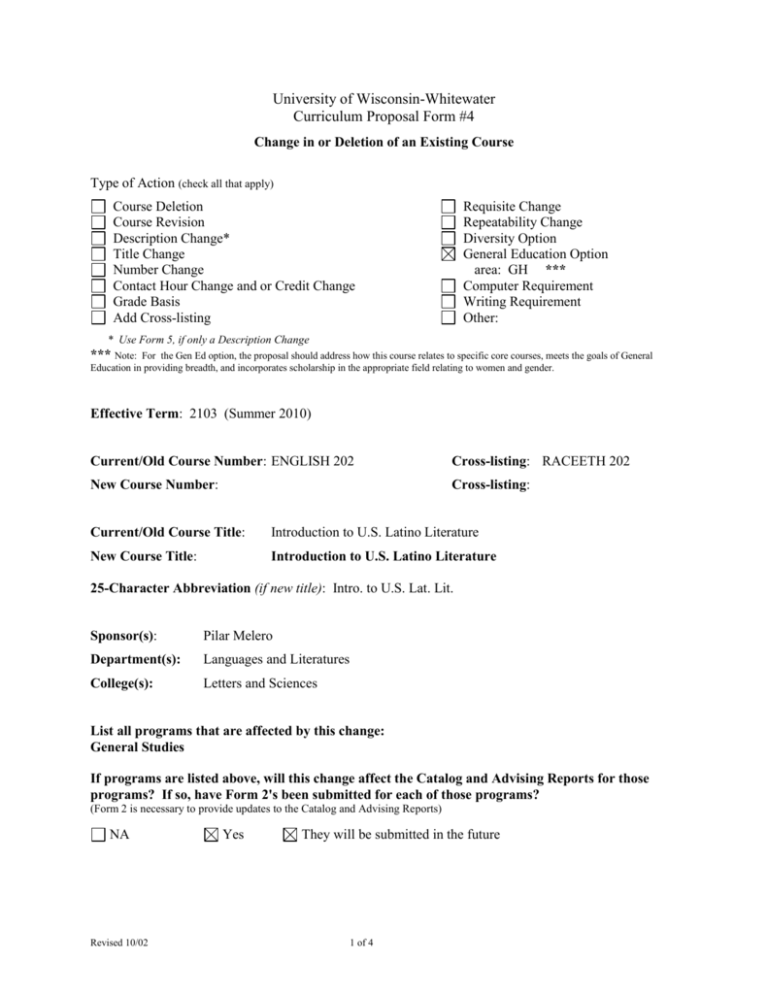
University of Wisconsin-Whitewater Curriculum Proposal Form #4 Change in or Deletion of an Existing Course Type of Action (check all that apply) Course Deletion Course Revision Description Change* Title Change Number Change Contact Hour Change and or Credit Change Grade Basis Add Cross-listing Requisite Change Repeatability Change Diversity Option General Education Option area: GH *** Computer Requirement Writing Requirement Other: * Use Form 5, if only a Description Change *** Note: For the Gen Ed option, the proposal should address how this course relates to specific core courses, meets the goals of General Education in providing breadth, and incorporates scholarship in the appropriate field relating to women and gender. Effective Term: 2103 (Summer 2010) Current/Old Course Number: ENGLISH 202 Cross-listing: RACEETH 202 New Course Number: Cross-listing: Current/Old Course Title: Introduction to U.S. Latino Literature New Course Title: Introduction to U.S. Latino Literature 25-Character Abbreviation (if new title): Intro. to U.S. Lat. Lit. Sponsor(s): Pilar Melero Department(s): Languages and Literatures College(s): Letters and Sciences List all programs that are affected by this change: General Studies If programs are listed above, will this change affect the Catalog and Advising Reports for those programs? If so, have Form 2's been submitted for each of those programs? (Form 2 is necessary to provide updates to the Catalog and Advising Reports) NA Revised 10/02 Yes They will be submitted in the future 1 of 4 Proposal Information: (Procedures can be found at http://acadaff.uww.edu/Handbook/Procedures-Form4.htm) I. Detailed explanation of changes (use FROM/TO format) There is one change 1. FROM a Diversity course TO a Diversity and General Studies course II. Justification for action: I have added the General Studies (humanities) component to make the course, which is already a diversity course, available to more students. The course addresses most of the General Education objectives: 1. By examining the literature of Latinos in the U.S. in its historical context, the students learn to think critically and analytically about a U.S. Latino culture and literature usually underrepresented in mainstream English courses, integrate and synthesize historical knowledge, and draw conclusions from complex information about the history and literature of Latinos in the U.S. 2. By learning about U.S. Latino literature, students will make sound ethical and value judgments based on the development of a personal value system, on an understanding of the cultural heritage students share, but that has been understudied in mainstream English courses. Also, by taking a close look at the history and literature of U.S. Latinos, the students will gain a knowledge of past successes, failures, and consequences of individual roles and societal choices. 3. By engaging in the study of U.S. Latino literature and history, students will understand and appreciate the cultures of the U.S.A. and other countries, both contemporary and historical; appreciate cultural diversity; and live responsibly in an interdependent world. 4. By analyzing U.S. Latino literature students will acquire the capacity to expand that base over their lifetime by understanding the way that knowledge is generated, organized, tested, and modified, while recognizing the past and current limits to understanding. 5. Students in U.S. Latino literature will engage in educated and guided discussions of the literature and produce written papers examining what they have read. Hence, they will communicate effectively in written, oral, and symbolic form with an appreciation of aesthetic and logical considerations in conveying ideas. 6. Students will be exposed to literature, theatre, and film in the U.S. Latino literature class, thus they will get an opportunity to appreciate the importance of the fine and performing arts. Revised 10/02 2 of 4 III. Syllabus/outline (if course Revision). This is NOT a course revision, but I am attaching an updated syllabus with a week/by/week schedule: U.S. Latino Literature Spring 2009 (Tentative Calendar) Dr. Melero I.UNDERSTANDING THE ROOTS OF LATINO LITERATURE IN THE U.S. January 21: Read: Introduction, Herencia, pp. 1-321 The Intricacies of Perspective Defining Latino, handout January 28: Latino Realities in the U.S. Read: Pat Mora, Bilingual Blues, and Where You From (handouts); Made in Texas (in D2L) Timeline of Latino Historical and Cultural Events, handout II. NATIVE LITERATURE February 4: The Narrative of Protest Read: Rodolfo “Corky” González, I am Joaquín (Yo soy Joaquín), 195 Read: Pedro Pietri, Puerto Rican Obituary, 212 February 11 and February 18: Identity Read the following: Piri Thomas, Down These Mean Streets, 234 Miguel Piñeiro, A Lower East Side Poem, 238 Aurora Levins Morales, Ending Poem, 268 Tato Laviera, AmeRícan, 27 (U.S. Latino, handout) Carolina Hospital, The Hyphenated Man, 24 (U.S. Latino, handout) Tino Villanueva, Chicano Dropout, 38 (U.S. Latino, handout) Martín Espada, Revolutionary Spanish Lesson, 130 (U.S. Latino, handout) Gloria Anzaldúa, How to Tame a Wild Tongue, 254 February 25: Gender, Color and other etcéteras Read: Nelly Rosario, On Becoming, 64 (U.S. Latino, handout) Verónica Chambers, Secret Latina at Large, 38 (U.S. Latino; handout) Cherríe Moraga, La Güera, 247 Judith Ortiz Coffer, The Story of My Body, 546 (Latino Boom, handout) 1 UNLESS otherwise noted, all readings are from Herencia. The Anthology of Hispanic Literature in the United States Revised 10/02 3 of 4 THE LITERATURE OF IMMIGRATION March 4 Encounters with the Modern City: Salomón de la Selva, A Song for Wall Street, The Secret, 352 Negotiating New Realities Anonymous, The Dishwasher, The Deportee, 379 Junot Díaz, No Face, 417 Mario Bancastro, Odyssey to the North, 421 March 11 Early Perspectives on Class and Gender Read: Luisa Capetillo, How Poor Women Prostitute Themselves, 432 María Luisa Garza, The Intelligent Woman, 434 Jesús Colón, The Flapper (La Flapper), 441 Cultural [Dis]Junctures Read: Jesús Colón, Kilping and I, 470 Roberto Fernández, Miracle on Eight and Twelfth, 473 Dolores Prida, The Herb Shop, 476 March 18 The [Dis]located Self Julia de Burgos, I was my Own Route, 488 Virgil Suárez, Spared Angola, 496 Cristina García, Matrix Light, 503 Carolina Hospital, Finding Home, 101 (Latino Boom, handout) Judith Ortiz Coffer, The Latin Deli: An Ars Poética, 105 (Latino Boom, handout) THE LITERATURE OF EXILE April 1 and April 15: Cuba: Cristina García, unpublished essay (handout) Gustavo Pérez-Firmat, Next Year in Cuba (book) April 22: Balseros April 29: Others: Marjorie Agosín, United States, 120 (U.S. Latino, handout) Claribel Alegría, Nocturnal Visits, 121 (U.S. Latino, handout) Isaac Goldemberg, Self-Portrait, 139 (U.S. Latino, handout) Victor Montejo, The Dog, 131(U.S. Latino, handout) Alicia Partnoy, The One Flower Slippers from The Little School, 161 (U.S. Latino, handout) Claribel Alegría, The Politics of Exile, 166 (U.S. Latino, handout) April 29-May 6 FINAL WORDS Julia Álvarez, How the García Girls Lost their A Revised 10/02 4 of 4
